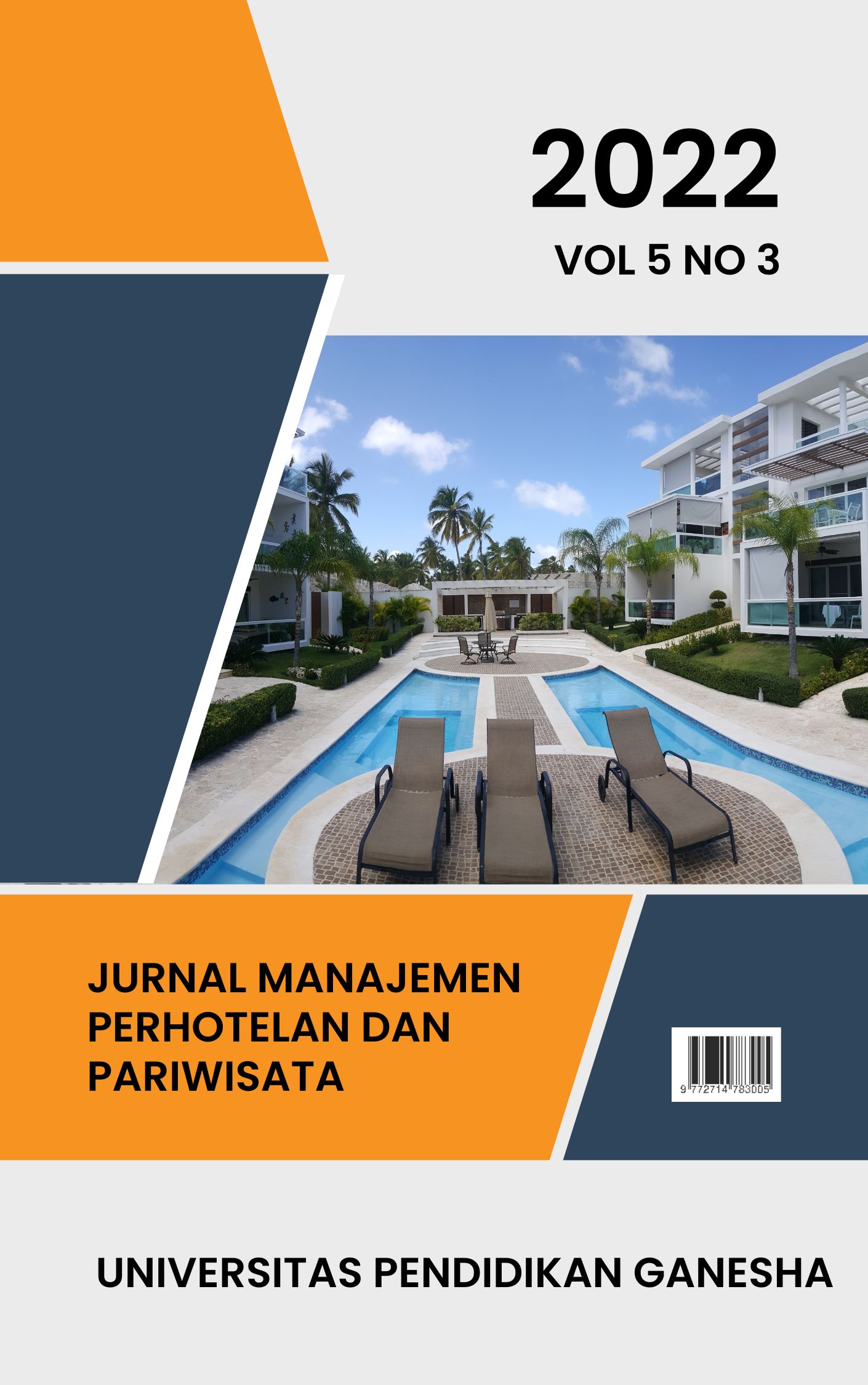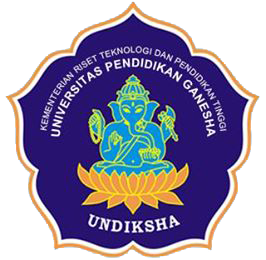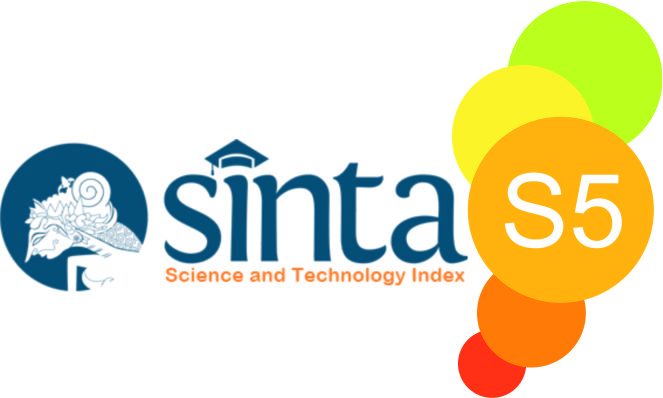Pengaruh Pemberian Insentif Perjalanan Wisata terhadap Motivasi dan Kinerja Agen Asuransi
Studi pada PT. AXA Financial Indonesia Sales Office Cabang Solo
DOI:
https://doi.org/10.23887/jmpp.v5i3.51345Kata Kunci:
Motivasi Kerja, Kinerja Karyawan, Insentif Perjalanan WisataAbstrak
Pemberian insentif perjalanan wisata sebagai bentuk apresiasi adalah cara yang sering dipergunakan oleh perusahaan untuk meningkatkan motivasi karyawannya, yang juga dapat berpengaruh terhadap kinerja yang lebih baik. Penelitian ini dilakukan dengan tujuan untuk mendeskripsikan pengaruh insentif perjalanan wisata terhadap kinerja; pengaruh insentif perjalanan wisata terhadap motivasi kerja; pengaruh motivasi kerja terhadap kinerja agen; dan menjabarkan peran motivasi sebagai pemediasi antara insentif perjalanan wisata dan kinerja agen. Data dari penelitian kuantitatif ini didapatkan melalui metode kuesioner dan studi dokumentasi, dan selanjutnya diolah menggunakan teknik analisis deskriptif statistik serta analisis inferensial menggunakan aplikasi SmartPLS3. Sampel dari penelitian ini adalah para agen asuransi pada PT. AXA Financial Indonesia (AFI) Sales Office Cabang Solo. Hasil dari penelitian ini memperlihatkan bahwa insentif perjalanan wisata tidak berpengaruh langsung terhadap kinerja agen. Akan tetapi insentif perjalanan wisata berpengaruh dengan sangat signifikan terhadap motivasi kerja, dan motivasi kerja berpengaruh signifikan terhadap kinerja agen. Dengan nilai t-statistics antara variabel insentif perjalanan wisata terhadap motivasi kerja adalah 12,231 dan nilai t-statistics antara variabel motivasi kerja terhadap kinerja agen adalah 6,497. Selain itu, motivasi kerja memiliki peran sebagai pemediasi parsial antara variabel insentif perjalanan wisata terhadap kinerja agen dengan nilai Variance Accounted For (VAF) sebesar 0,78.
Referensi
Arikunto, S. (2019). Prosedur penelitian suatu pendekatan praktik. Rineka Cipta.
Chin, W. W. (1998). The Partial least squares approach to structural equation modeling. Modern Methods for Business Research, 295(2), 295–336.
Fenich, G. G., Vitiello, K. L., Lancaster, M. F., & Hashimoto, K. (2015). Incentive travel: A view from the top. Journal of Convention and Event Tourism, 16(2), 145–158. https://doi.org/10.1080/15470148.2015.1022917
Firman, D. (2017). Pengaruh insentif dan motivasi terhadap kinerja karyawan PT Bunda Asri Lestari Bandar Lampung. http://repo.darmajaya.ac.id/id/eprint/295
Ghozali, I., & Latan, H. (2015). Partial least square: Konsep, teknik dan aplikasi menggunakan program SmartPLS 3.0 untuk penelitian empiris (2nd ed.). Badan Penerbit Universitas Diponegoro.
Handoko, T. H. (2016). Manajemen edisi kedua. BPFE Press.
Hasibuan, H. M. S. P. (2014). Manajemen sumber daya manusia. Bumi Aksara.
Heathfield, S. M. (2019). Develop incentive travel programs for your workplace. In The Balance Careers. https://www.thebalancecareers.com/incentive-travel-programs-for-the-workplace-4584834
Khan, M., Daniyal, M., & Ashraf, M. Z. (2020). The relationship between monetary incentives and job performance: Mediating role of employee loyalty. International Journal of Multidisciplinary and Current Educational Research, 2(6), 12–21. www.ijmcer.com
Li, X., Lu, L., & Chi, C. G. Q. (2018). Examining incentive travelers: How motivation affects organizational commitment. International Journal of Tourism Research, 20(6), 830–842. https://doi.org/10.1002/jtr.2235
Mair, J. (2015). Incentive travel: A theoretical perspective. Event Management, 19(4), 543–552. https://doi.org/10.3727/152599515X14465748512803
Manurung, J. S., Rismawati, & Simanjuntak, P. (2017). Pengaruh faktor-faktor perjalanan insentif terhadap motivasi dan kinerja sumber daya manusia pada perusahaan asuransi di Kotamadya Medan. Human Resource Management. https://www.researchgate.net/publication/332072448
Martin, G., Taufiq, M., & Darsono. (2017). Peningkatan kinerja melalui insentif dan komunikasi yang di mediasi motivasi berprestasi pada PT. Rajawali Nusindo Area Jawa Tengah. Bingkai Manajemen, 202–218.
Meiditami, R., & Sunuharyo, B. S. (2018). Pengaruh insentif terhadap prestasi kerja karyawan dengan variabel mediator motivasi kerja (Studi pada karyawan divisi individual customer business development (ICD) kantor pusat PT Bank Central Asia, Tbk). Jurnal Administrasi Bisnis (JAB)|Vol, 60(2).
Mustofa, G. (2017). Pengaruh insentif terhadap kinerja karyawan dengan motivasi sebagai variabel moderasi (Studi pada agen PT. Jiwasraya Kantor Cabang Malang Kota). Jurnal Manajemen Bisnis, 7(02), 139–148.
Nasution, H. P. (2016). Effectiveness of incentive travel program more meaningful, motivational and memorable. Proceedings ICERVED (Revitalization of Vocational in Free Trade Era)
Petriella, Y. (2018). Orang Indonesia makin sering ke luar negeri, bisnis wisata outbond. In Ekonomi Bisnis.com. https://ekonomi.bisnis.com/read/20181001/12/844135/orang-indonesia-makin-sering-ke-luar-negeri-bisnis-wisata-outbound-menjanjikan
Puri, K. P., Suddin, A., & Suprayitno. (2016). Pengaruh kompensasi terhadap kinerja karyawan dengan motivasi sebagai variabel mediasi (Survei pada karyawan PD. BPR Bank Solo). Jurnal Ekonomi Dan Kewirausahaan, 16, 150–158.
Putra, P. D., & Susanti, F. (2019). Pengaruh pemberian insentif dan motivasi terhadap kinerja karyawan PT. FIFGROUP Pos Painan. https://doi.org/10.31219/osf.io/hu4mn
Shinew, K. J., & Backman, S. J. (1995). Incentive travel: An attractive option. Tourism Management, 16(4), 285–293. https://doi.org/10.1016/0261-5177(95)00018-J
Solimun. (2002). Structural equation modeling lisrel dan amos. Fakultas MIPA Universitas Brawijaya.
Statistik, B. P. (2013). Proyeksi penduduk Indonesia 2010-2035. Badan Pusat Statistik Indonesia.
Sugiyono. (2015). Metode penelitian kuantitatif, kualitatif dan R&D. CV ALFABETA.
Supatn, N. (2016). Roles of travel incentives on employee motivation and performance. Business Administration Journal of Private Higher Education Institutions of Thailand, 5(1).
Sutrisno, E. (2017). Manajemen sumber daya manusia. Kencana Prenada Media Group.
Thomas, S. N. (2018). Market study of the outbound incentive travel from Kerala. Intercontinental Journal of Marketing Research Review, 6(12), 7–15. https://scholar.google.com/scholar?oi=bibs&cluster=3357744917856646377&btnI=1&hl=en
Wardana, M. A. (2017). Pengaruh pertimbangan, pengetahuan, sikap nasabah terhadap keputusan nasabah memilih produk bank syariah di kota Denpasar. Forum Manajemen STIMI Handayani Denpasar, 14(1), 79–88.
Wardana, M. A. (2021). Faktor yang mempengaruhi loyalitas nasabah bank syariah mandiri KC Banyuwangi. Forum Manajemen STIMI Handayani Denpasar, 19(1), 29–34.
Wardana, M. A., & Parwati, K. S. M. (2021). Integrasi faktor niat berkunjung wisatawan lokal di Bali pada masa pandemi covid 19. Jurnal Ilmiah Hospitality Management, 12(1), 50–58.
Wardana, M. A., Rahyuda, I. K., Sukaatmadja, I., & Giantari, I. (2021). Antecedents and consequences of intention to become a customer: A case study of islamic banks in Indonesia. The Journal of Asian Finance, Economics and Business, 8(4), 827–839.
Wibowo. (2017). Manajemen kinerja. Rajawali Pers.










